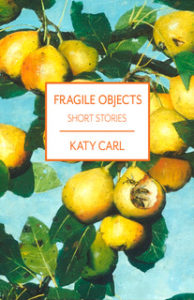 Review by Laura Dennis
Review by Laura Dennis
When you hear “fragile objects,” what is the first thing that comes to mind? Do you think of valuables one keeps locked in a case lest they be destroyed, or does your mind immediately reach for the metaphors such an expression might imply? In Katy Carl’s new story collection, the expression refers to all of that and more. On the one hand, we have the collection of “frangible curiosities Bub knew he must never touch” in the title story that also opens the collection. On the other, readers encounter a whole host of intangible breakables, most notably relationships and belief systems of every kind.
The tension between the quest for freedom and one’s obligation to other people or ideologies governs many of the stories in Fragile Objects. In “Pantheon” a young woman flees a cult, only to find new forms of oppression in the house she once dreamed would be her promised land. “Company Men” scathingly portrays a group of priests trying—or not—to deal with accusations against one of their own, while the rather gothic “Omnes Habitantes in Hoc Habitaculo” features a protagonist whose ghosts can only be exorcised once she has been institutionalized. “The Convert” shows a young man trapped by his limited understanding of Catholicism while “Sequatchie Valley” recounts in inexorable detail the travails and downfall of a family trying to live off the land.
There are more than a few fragile men in these stories, not to mention destabilized friendships and family ties. Of particular interest to MER readers will be the many and varied understandings of motherhood in which time and again, women are anything but delicate and fragile. On the contrary, they question other people’s decisions (if not always as strongly as one might like), push back, and pull away. The contrast between genders comes across particularly well in the paired stories “Allie” and “Jack” in which the same events are told from their two very different perspectives. It is worth noting too that many of these women show up for those they love, particularly in the final story, “Awards Day.”
The variety of tones and narrative techniques, not to mention the use of language, are a constant source of delight. The reader lands in directly in scene at the beginning of each piece, as befits the short story genre. Consider, for example, the opening line of “Company Men”:
When the bad letter crossed the bishop’s desk for the third time, he awoke from the fugue in which he had been admiring the lace-like curls of vapor that rose from his coffee.
Or that of “Sequatchie Valley”:
When Ward Tarrant decided he wanted to farm, having already chosen the westernmost edge of the nearby Sequatchie Valley for a place to take his stand, his wife Lucia had questions.
These sentences serve as the opening to journeys through a full emotional range rendered in sensory-rich, almost synesthetic language. The reader is laughing out loud one minute, the next contemplating ordinary joys and sorrows. At other times, blistering criticism gives way to episodes so dark one has to sit a moment before moving on. The changes in point of view and narration also lend variety to the collection, as do the lists (“Sequatchie Valley”), text messages (Battleground State”), and extended monologue that opens “Hail Thee, Festival” in which an older, experienced volunteer talks at a first-time volunteer at a school fundraiser.
Most of the stories are of roughly the same length, around 20 pages, though the longest, “Sequatchie Valley,” comes in at 49 while the one immediately following it, “Solo,” has just 2. Regardless of length, all have that quality extolled by Aristotle: surprising yet inevitable endings, whether these be tragic, triumphant, or somewhere in between. The worlds we build reveal themselves to be so fragile, on the verge of falling apart. Are the sacrifices we make to preserve them worth it? Fragile Objects explores fresh answers to that age-old question.
Fragile Objects: Short Stories by Katy Carl
Wiseblood Books 2023 $15.00
ISBN 9781951319113
Laura Dennis is a college professor and co-editor of book reviews for MER. She has published book reviews and her own creative work in a variety of outlets, including MER Vox Quarterly, Still: The Journal, Change Seven, Bethlehem Writer’s Roundtable, Bluff & Vine, Northern Appalachia Review, and Kentucky Philological Review.
